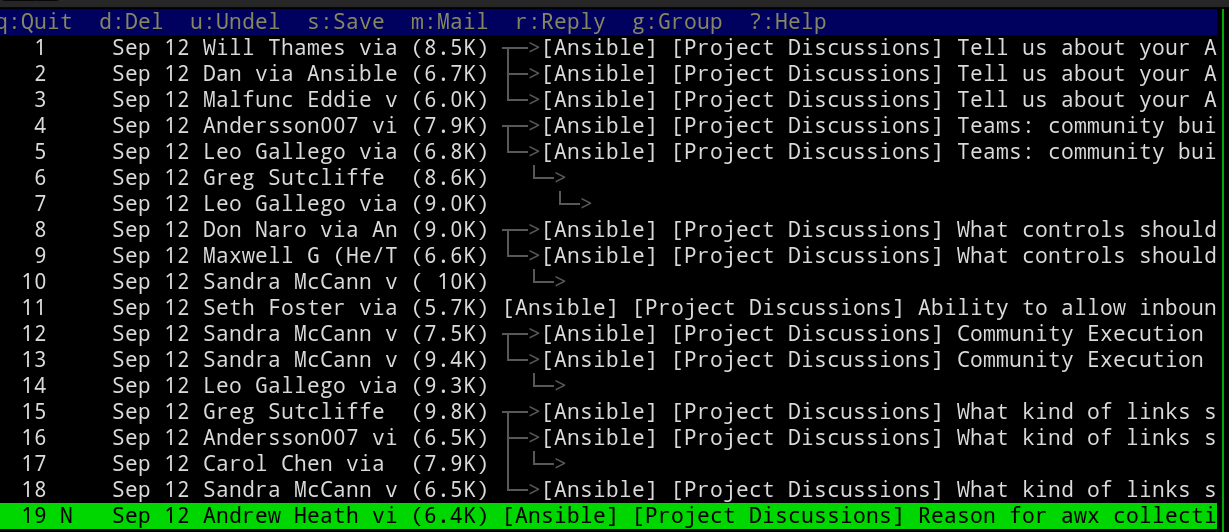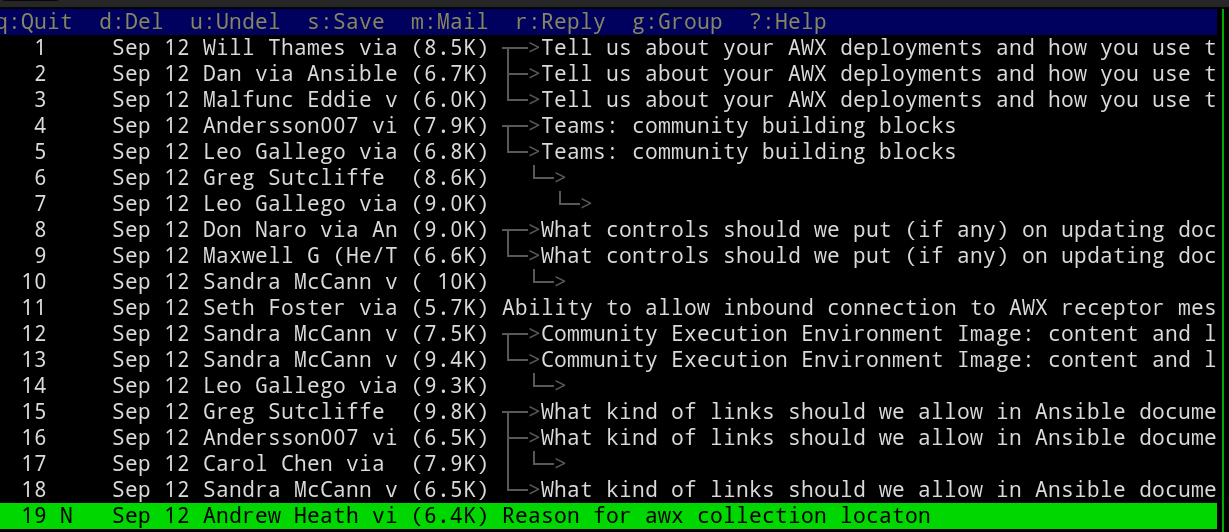TL;DR: ^
You can munge subjects for display only using the subjectrx Mutt configuration directive.
The Setup ^
I use the terminal-based email reader Mutt.
Many projects that I follow are switching away from email discussion lists in favour of web-first interfaces (“forums”, I think the youngsters are calling them now) like Discourse. That is fine—there’s lots of problems with trying to run a busy community over email—but Discourse offers a “mailing list mode” and I still find my Mutt email client to be a comfortable way to follow discussions. So all my accounts on the various Discourse instances are set to mailing list mode.
The Problem ^
One of the slight issues I have with this is the subject lines that Discourse uses. On an instance with a lot of categories and sub-categories, these will all be prepended to the subject line of each email using up quite a lot of screen space.
The same is true for legacy mailing list subject tags, but in that environment the admins were generally conscious that whatever text they chose would be prepended to every subject, so they tend to choose terse tags like “[users]” for example.
There was a time when subject line tags were controversial amongst experienced email users, because experienced email users know how to sort and filter their mails based on headers and don’t need a tag in the subject line to let them know what an email is. It doesn’t seem to be very controversial any more; I hypothesise that’s because new Internet users don’t use email as much and so don’t value spending much time working out how to get their filtering just right, and so on. So, most legacy mailing lists that I’m part of now do use terse subject tags and not many people complain about that.
Since the posts on Discourse are primarily intended for a web browser, the verbosity of the categories is not an issue. It’s not uncommon to see a category called, say, “Help & Support” and then within that a sub-category for a particular project, e.g. “Footronic 5.x”. When Discourse sends out an email for a post to such a category, it’ll look like this:
Subject: [Help & Support] [Footronic 5.x] Need some help getting my Foo into alignment after passing through a bar-quux transform |
Lots of space used by that prefix, on every message, and pointlessly so for me since these mails will have been filtered into a folder so I always know which folder I’m looking at anyway: all of the messages in that folder would be for help and support on Footronic 5.x. Like most email clients, Mutt has an index view that shows an overview of all the emails with a single line for each. Long subjects are truncated at the edge of my terminal.
I’ve put up with this for years now but the last straw was the newly-launched Ansible forum. Their category names are large and there’s lots of sub-categories. Here’s an example of what that looks like in my 95 character wide terminal.

This is quite irritating! I wondered if it could be fixed.
The Fix ^
Of course the Mutt community thought of this, and years ago. subjectrx! You put it in your config, specifying a regular expression to match and what it should be replaced with. For example:
subjectrx '\[Ansible\] \[[^]]*\] *' '%L%R' |
That matches any sequence of “[Ansible] ” followed by another set of “[]” that have anything inside them, and replaces all of that with the left side of the match (%L) and the right side of the match (%R). So that effectively discards the tags.
This happens only on display; it doesn’t modify the actual emails on storage.
Here’s what that looks like afterwards:

Much better, right?
And that’s one of the reasons why I continue to use Mutt.
Other Solutions ^
Off the top of my head, there are some other ways this could have been done.
Alter emails upon delivery ^
It would have been pretty simple to strip these tags out of emails as they were being delivered, but I really like to keep emails on storage the same as they were when they arrived. At the very least doing this will cause a DKIM failure as I would have modified the message after it was signed. That wouldn’t be an issue for my delivery since my DKIM check would happen before any such editing, but I’d still rather not.
Run the subject lines through an external filter program ^
The format of many things in Mutt is highly configurable and one such format is index_format, which controls how the lines on the index view are displayed.
Sadly there is not a builtin format specifier to search and replace in the subject tag (or any other tag), but you can run the whole thing through an external program, which could do anything you liked to it. That would involve fork()ing and exec()ing a process for every single mail in a mailbox though. Yuck.
On Discourse ^
This is not a gripe about Discourse. I think Discourse is a better way to run a busy community than email lists. At this point I’d be happy for most mailing lists I’m part of to switch to Discourse instances, especially the very busy ones. I’m impressed with the amount of work and features that Discourse now has.
The only exception to that I think is that purely question-answer support mailing lists might be better off with a StackOverflow-style approach like AskUbuntu. But failing that, I think Discourse is still many times better than a mailing list for that use case.
Not that you asked, but I think the primary problem with email as a community platform is that only old people use email. In the 21st century it’s an unacceptable barrier to entry.
The next most serious problem with email for running a community is that any decently-sized community will have a certain percentage of utter numpties; these utter numpties won’t be self-aware enough to know they are utter numpties, and they will post a lot of nonsense. The only way to counter a numpty posting nonsense is to reply to it and call them out. That is exhausting, unrewarding work, which frequently goes wrong, adding to the noise and ill-feeling. Problem posters do not get dealt with until they reach a level bad enough to warrant their posting rights being removed. Forums like Discourse scale their moderation tasks much better, with a lot of it being amenable to wide community input.
I could go on to list a lot more serious problems but those two are the worst in my opinion.